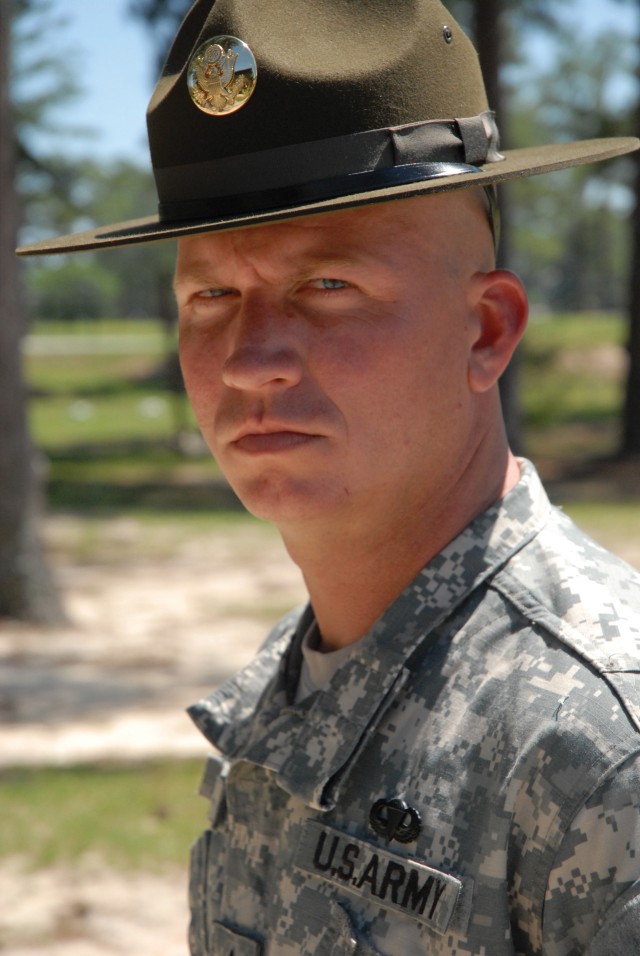Recruiter Sgt. 1st Class Keven Parr's way of life is about to change substantially. This month, he starts his new assignment at Fort Sill, Okla., as a drill sergeant.
For the next two years, instead of sitting behind a desk making phone calls, doing paperwork and meeting and greeting prospects, parents, educators and COIs, the former station commander of the Sedalia, Mo., station will spend long grueling days immersed in classroom work and physical activity helping turn new recruits into Soldiers.
"I'll be there when they wake up and I'll be there when they go to sleep," said Parr.
Parr was among the first group of 10 Army recruiters (MOS 79R) to complete the Army Drill Sergeant School at Fort Jackson, S.C., which ended the first week of June.
In a continuing effort to increase recruiters' knowledge of the operational Army, U.S. Army Recruiting Command Sgt. Maj. Stephan Frennier thought training recruiters to be drill sergeants would be another great opportunity to diversify and enhance NCOs' leadership experiences and give recruiters the chance to train the future Soldiers they've recruited.
"Having 79R NCOs serving as drill sergeants for two years is a win-win situation for the Army and USAREC," said Frennier. "The Army is getting proven professional NCOs to train and transition future Soldiers into Soldiers, and USAREC in return, will get back NCOs with broader leadership experience."
The Drill Sergeant School Commandant Command Sgt. Maj. Teresa King said only the top 10 percent of each MOS will ever even get the opportunity to attend the DSSC. She concurred with Frennier that this is invaluable experience for a recruiter.
"Drill sergeant duty is one of the highest honors the Army can bestow on an NCO. All NCOs chosen for drill sergeant duty bring their own unique experiences and expertise to performing one of the toughest and most rewarding jobs an NCO can perform. NCOs by design are teachers, coaches and mentors. However, very few are to execute the high honor of shaping civilians into the best Soldiers in the world."
Having always wanted to be a drill sergeant, Parr jumped at the opportunity.
"I wanted to experience that. I think every Soldier looks up to the drill sergeant they had. Everybody looks at them like they're [the] standard that everybody should strive to be. I still remember my drill sergeant. They're going to remember their recruiter and they're going to remember their drill sergeant, and now I get to be both of them."
But for Parr, becoming a drill sergeant wasn't just fulfilling a long-time desire, it was also professional development.
"I didn't want to be stagnant in my career, I wanted to expand. I didn't want to become complacent. [It] was just a different experience I felt like I needed to take, or I'd probably never get that opportunity again."
The nine other 79Rs who successfully completed Drill Sergeant Course 077-10 are Sgts. 1st Class Matthew Hughes and William Thomsen, 3rd Recruiting Brigade; Staff Sgts. Isreal Herrera, Matthew Montoya and Michael Brown, 2nd Recruiting Brigade; Sgt. 1st Class John Byars, Special Operations Recruiting Battalion; Staff Sgt. Van Lovvorn, 6th Recruiting Brigade; and Staff Sgt. Christopher Miller and Sgt. 1st Class Louis Matusek, 5th Recruiting Brigade. All will report to their drill sergeant assignments this month and are scheduled to return back to recruiting in two years.
"It gives them the double badge," said Kristy Milchick, human resources specialist with USAREC's Personnel Development Division, who thinks the potential benefits of having recruiter drill instructors is unlimited.
"[They] will probably be able to be more effective when talking to new recruits or civilians wanting to be Soldiers because their experience is now. I mean, they're senior staff sergeants and sergeants first class and they haven't been to basic training in maybe 12 or 14 years."
Milchick said recruiters with the double badge could put their experience to use by acting as drill sergeants when using the rock wall at recruiting events. She believes they'd also be great future Soldier leaders since they'll know exactly what the kids would have to go through during basic training.
The more information I think the kids have before they go, I think the more successful they will end up being," said Milchick. "And then of course, if it's a good future Soldier program, we usually have less losses."
Out of a class of 66, Parr was named the distinguished honor grad. King said he was chosen based on the total Soldier concept.
"He not only demonstrated a mastery of all the tasks taught here at the Drill Sergeant School, but he exceeded the standards in every area. He excelled in physical fitness and proved to be a decisive and positive leader when placed in charge."
Parr said, "It was an honor to not only represent the [recruiters who] were there, but also all of USAREC, being the distinguished honor grad."
"What a great representation of our outstanding 79R NCOs," Frennier commented. "I know all of our newly qualified 79R drill sergeants will serve with distinction as they assume their duties in the upcoming months."
USAREC was able to free up 10 NCOs to become drill sergeants because the command is currently enjoying an over population of 79Rs, according to Milchick.


Social Sharing